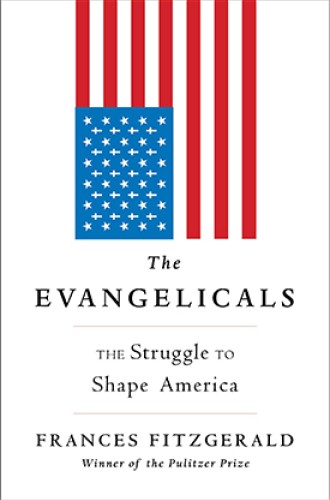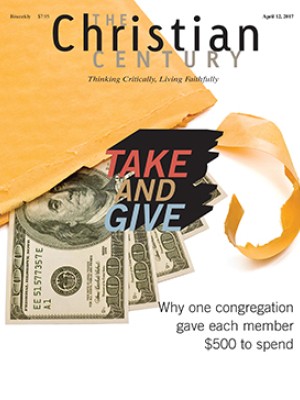Reading evangelical history with one eye closed
Frances FitzGerald gets the religious right wrong—along with the evangelical tradition generally.
One would think that the decision on the part of a distinguished author such as Frances FitzGerald to take on the sweep of evangelicalism in America would be cause for celebration. FitzGerald wrote an acclaimed history of the Vietnam War, Fire in the Lake, and a lively book about American visions of community, Cities on a Hill. But this hefty book’s coverage of a broad and internally diverse movement is curiously pinched and narrow—and not merely because the author elects to omit the rich tradition of African-American evangelicalism.
The Evangelicals suffers from the common disease of presentism: the author takes the current political manifestations of evangelicalism as the essential clue to its historical identity. FitzGerald dispatches with two centuries of evangelical history—everything up to the time of the Scopes Trial of 1925—by page 142. Her approach also betrays a bias for the Reformed or Calvinist strain of evangelicalism, with its emphasis on theological orthodoxy, as opposed to the Wesleyan-holiness strain and its focus on personal and social reform. (Donald Dayton’s indispensable account of the latter tradition, Discovering an Evangelical Heritage, which would have provided some balance, appears nowhere in her extensive bibliography.) The effect is somewhat akin to viewing a landscape with one eye closed. Yes, the other eye makes adjustments, but the depth and texture of the panorama is lost.
Read our latest issue or browse back issues.
FitzGerald begins her narrative with the Great Awakening of the 18th century. She mentions the three Ps that came together in that colonies-wide revival—Pietism, Presbyterianism, and Puritanism—although the emphasis clearly is on theologian Jonathan Edwards and the vestiges of New England Puritanism. Dating the Awakening to Northampton in 1734, she ignores several precursors to evangelicalism who appeared decades prior (including Edwards’s grandfather Solomon Stoddard, the Dutch ministers Guilliam Bertholf and Theodorus Jacobus Frelinghuysen, and the Swedish pietist Lutheran Lars Tollstadius). She mistakenly locates the center of the Dutch Reformed revival in New York rather than New Jersey.
FitzGerald’s treatment of the Second Great Awakening at the turn of the 19th century is more balanced. She catalogs some of the social reform initiatives that arose out of the Second Awakening, but she fails to mention the searing critiques of capitalism issued by the most influential evangelical of the 19th century, Charles Grandison Finney.
The author’s preference for the Reformed axis over the Wesleyan-holiness strain bedevils her treatment of the 20th century and the emergence of the religious right. When, for example, she notes that Carl F. H. Henry, founding editor of Christianity Today, articulated some tepid criticisms of business, she is unable to connect those remarks to precedents in the previous century. Similarly, she treats the emergence of the religious right as a kind of immaculate mobilization that “sprang up all at once among networks of pastors across the South from Virginia to Southern California” and gives scant attention to countervailing voices in the evangelical world.
Those voices may not have enjoyed the megaphone of media empires, but they were hardly silent. FitzGerald recounts the drafting of the Chicago Declaration of Evangelical Social Concern in November 1973, but then progressive evangelicals drop almost entirely from the narrative until the waning years of the George W. Bush administration. Jimmy Carter, a Southern Baptist deacon and Sunday school teacher, the nation’s first avowed born-again president and a progressive evangelical, receives only scattered mention—far less, for example, than Phyllis Schlafly or even Herb Titus, a truly fringe figure. The chapter on George W. Bush, the nation’s second born-again president, by contrast, consumes more than a hundred pages.
FitzGerald renders the inner workings of the religious right in granular detail. We hear, for example, about James Dobson’s tantrums and Richard Land’s partisan harangues, but only brief and belated reference to Sojourners magazine’s Call to Renewal or the effort of Red Letter Christians to emphasize the social teachings of Jesus. The author commendably plunges into the works of Rousas John Rushdoony and Francis Schaeffer, but the writings of Jim Wallis receive no comparable midrash. Shane Claiborne, a “rock star” among younger evangelicals and a radical (not progressive) evangelical, merits only a single reference.
FitzGerald’s reluctance to identify the principal catalyst for the religious right ultimately hobbles her attempt in the epilogue to interpret the 2016 election, in which Donald J. Trump received 81 percent of the white evangelical vote. Rather than draw on definitive historical research (as well as the testimony of Paul Weyrich, Ed Dobson, Grover Norquist, Richard Viguerie, and others) that locates the origins of the religious right in the defense of tax exemption for segregated schools, FitzGerald opts for the catalog approach, asserting that the galvanizing issues were the defense of school prayer and the opposition to abortion, gay rights, and the Equal Rights Amendment. Those latter explanations have been explicitly disavowed by the aforementioned founders of the religious right.
The 2016 election allowed evangelicals finally to dispense with the fiction that their political behavior was motivated by moral concerns or “family values.” Their support for a thrice-married, self-confessed sexual predator and casino owner represented a definitive break from the noble, reform-minded tradition of Finney and 19th-century evangelicalism. At the same time, tolerance for Trump’s racist rhetoric signaled a return to the founding concerns of the modern religious right.
Over the long sweep of history, however, and viewed with both eyes open, the religious right is less the evangelical juggernaut that FitzGerald supposes than a tragic aberration within the evangelical tradition.





